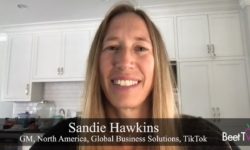Marketers face a variety of challenges in measuring the effectiveness of their advertising campaigns amid rapid changes in technology, public policy and consumer habits. Overcoming these hurdles requires an industrywide effort among advertisers, media owners and ad-tech companies.
The state of digital ad measurement “is at an all-time low,” Lynda Clarizio, an adviser and member of the board of directors of contextual analytics firm OpenSlate, said in this interview with Beet.TV. “I’m really sad to say that, but there’s a lot of data points that demonstrate that.”
She cited recent reports about inflated audience estimates from a major social network and digital media startups as examples of the current condition of ad metrics.
“We’ve talked for a long time now about needing some standardized form of measurement for attention or engagement,” Capizio said. “We still don’t have that.”
These issues present opportunities for companies to develop solutions to help standardize the measurement of contextual media placements and the creative elements of advertising, she said.
Martech Consolidation
Capizio also foresees more consolidation among measurement companies and marketing technology startups as brands demand a broader group of services from a single vendor.
“As we head into 2022, we’re going to see more consolidation now in the measurement space where companies that were doing one type of measurement may be aggregating and buying other companies to consolidate that,” Capizio said. “It makes so much sense because when you’re approaching brands to do measurement, you want to have a full suite of solutions.”
Audience identity verification and resolution is a key area for consolidation, along with businesses that help brands harmonize and activate their first-party data about their customers, she said.
“OpenSlate, in particular, operates in the area of social media, and they are an independent third party that is providing brand safety and contextual measurement across social media,” Capizio said. “Companies like OpenSlate can only provide that measurement by having access to the APIs of those social media companies.”
Contextual measurement requires greater scale among hundreds of media outlets for more effective targeting, she said.
Capizio is optimistic about continued innovation in media measurement, driven by inspired leaders with an entrepreneurial streak.
“I love working with CEOs who are super-passionate about what they’re doing, and that are also trying to solve a problem that really needs to be solved,” she said. “There’s a lot of change ahead, and hopefully, it’s all going to be changed for the better, and we’ll be able to look proudly on this industry in future years, and say, ‘We did the right thing both for brands and for consumers.’”
You are watching “Reshaping Contextual Advertising,” a Beet.TV leadership series presented by OpenSlate. For more videos, please visit this page.































